新概念二册PPT第18课
合集下载
新概念2册18课PPTPPT课件
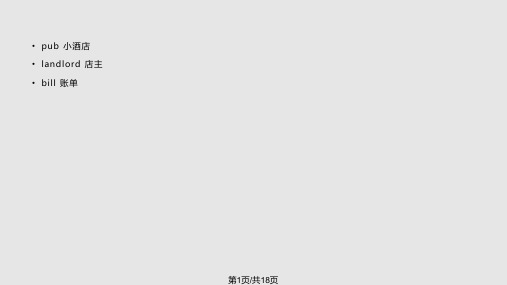
第9页/共18页
• 3) v. 离开 • leave some place 离开某个地方 • leave for some place 离开去某地 • eg. Leave England for a tour of the world. 离开英国去环球旅游。 • 4) on leave 休假中
第10页/共18页
第6页/共18页
Listening comprehension
第7页/共18页
Te x t • look for 寻找(过程) • eg. I am looking for my bag. • look for a job 找工作 • find 找到(结果,不能用进行时态) • eg. I found my brooch under the sofa. 我是在沙发下面找到胸针的。 • find out 发现,找出,搜出(结果) • eg. You should find out (the answer) for yourself. 你应该自己找出
第5页/共18页
• lord • as drunk as a lord 酩酊大醉 • eg. Lord! 天啊!哎呀!哎哟! • lord n. 贵族,勋爵 • duke [dju:k] 公爵 • marquis ['mɑ:kwɪs, mɑ:'ki:] 侯爵 • earl [ɜ:l] 伯爵 • viscount ['vaɪ,kaʊnt] 子爵 • baron ['bærən] 男爵 • sir 爵士 • lady • eg. Lady first. 女士优先。 • Ladies and gentlemen 先生们,女士们 (称呼套话) • Ladies 女厕所
第11页 随着(表示事态及状况的变化和进展) • eg. As she grew older, she became more pessimistic
• 3) v. 离开 • leave some place 离开某个地方 • leave for some place 离开去某地 • eg. Leave England for a tour of the world. 离开英国去环球旅游。 • 4) on leave 休假中
第10页/共18页
第6页/共18页
Listening comprehension
第7页/共18页
Te x t • look for 寻找(过程) • eg. I am looking for my bag. • look for a job 找工作 • find 找到(结果,不能用进行时态) • eg. I found my brooch under the sofa. 我是在沙发下面找到胸针的。 • find out 发现,找出,搜出(结果) • eg. You should find out (the answer) for yourself. 你应该自己找出
第5页/共18页
• lord • as drunk as a lord 酩酊大醉 • eg. Lord! 天啊!哎呀!哎哟! • lord n. 贵族,勋爵 • duke [dju:k] 公爵 • marquis ['mɑ:kwɪs, mɑ:'ki:] 侯爵 • earl [ɜ:l] 伯爵 • viscount ['vaɪ,kaʊnt] 子爵 • baron ['bærən] 男爵 • sir 爵士 • lady • eg. Lady first. 女士优先。 • Ladies and gentlemen 先生们,女士们 (称呼套话) • Ladies 女厕所
第11页 随着(表示事态及状况的变化和进展) • eg. As she grew older, she became more pessimistic
新概念英语第二册Lesson18heoftendoesthis课件

Words and phrases
5. pay the bill 付账
6. take 把…带走 bring 把…带来 fetch 去取某物(一来一去的动作)
Words and phrases
7. return v. ①come back 回来
eg: He has just returned from Australia. ②give back 归还 eg: He returned the book to the library. n. 回来,归还 in return for … 作为…的回报
Exercise
一、选词填空
beside besides except look for find look forward to
1.When the bus stopped, an old man beside me got off.
2.No one can contact the manager except
miss you.
6.I’m looking for
my glasses. I can’t find them
anywhere.
Exercise
二、单项选择
1.In order to keep fit, I B a walk after dinner everyday.
A. get
B. take
C. make D. try
A. away
B. in
C. up
D. down
Fill in the blanks 1
He often does this! After I had had lunch at a village__p_ub__, I looked for my bag. I had left it on a chair beside the door and now it wasn't there! As I was looking for it, the __la_n_d_lo_r_d__came in.”Did you have a good meal?" he asked. 'Yes, thank you,' I answered, 'but I can't pay the__b_il_l __. I haven't got my bag.'The landlord smiled and immediately went out. In a few minutes he returned with my bag and gave it back to me.'I'm very sorry,' he said. 'My dog had taken it into the garden. He often does this!'
新概念英语第二册课件Lesson18
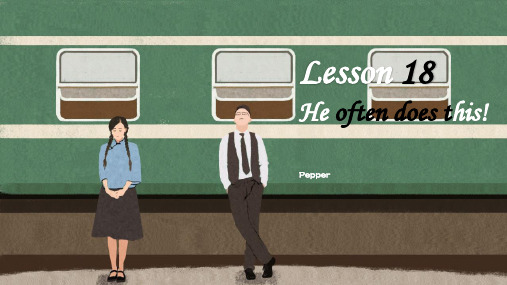
在同一范围内
Guilin is in the north of Guangxi.
to
不在同一范围内,也不接壤 Japan is to the east of China.
next to 紧靠…的旁边
The shop is next to the school.
beside 在…旁边
Come and sit beside (/by) me.
表示延续时间的介词
介词
用法
by
意为“在……之前;不迟于……”
for
意为“在……之前;不迟于……”
in
意为“在……以后;在……时间内”
since
意为“自从……以来;自……以后”
until
用于否定句中,意为“直到……才”,其前的谓语动词多为非延续性动词
用在肯定句中,意为“直到……为止”,其前谓语动词须用延续性动词
by
在…旁边,与 beside 可以互换 There is a chair by(beside) the table.
near 在…附近
There is a theatre near his home.
表示方位的介词
介词
用法
例句
around over
above
under
在…周围 在…(垂直)的正上方 抽象概念职位高低 在…(不一定垂直)的上方 职位高低 在…(垂直的)正下方
have用于“情态动词+have+过去分词”的结构,有推测、假设之意。 1.must+have+过去分词,表示对过去时间发生的动作或存在的情况 的推测,一般用于肯定句。
You must have left your bag in the theatre.
新概念英语第二册课件Lesson18共15页PPT

land 陆地;土地 lord 贵族;勋爵(包括公侯伯
子男)
3.bill /bil/ n. 帐单
• 1.议案;法案 • 2.纸币;钞票 • 3.广告;海报 常用搭配: foot the bill 付账;负责 pay/settle the bill 付账 fill the bill 适合
text
• 1、After I had had lunch at a village pub, I looked for my bag.
• Pub是public house(酒店,酒店) 的缩写
• Let’s go to the pub for a drink.
• 2、I had left it on a chair beside the door and now it wasn't there!
• leave除了“离去,离开,出发” 的意思,还可以表示“把(人、 物)留下,遗留,丢下”等。
还有许多其他事要做。 • beside pron. 在……旁边,在……附近 • besides adv. 而且,并且,此外;pron. 除……
之外(还)
• I’m quite busy today. Besides, I’ve got a bad cold.
• There were a lot of people at the party besides us.
Have的用法
• 1、have作为助动词构成各种完成时和完成 进行时
• 2、have还可以作完全动词,当作“具有、 拥有”讲时,它和have got通常可以互换。 have做 “有, 患病” 概念时, 可作为实义动 词, 也可作为非实义动词。在英国英语中的 疑问句和否定句中have(具有)的用法与 be相同,即可以不用助动词do或did;在美 国英语中,常用do助动词和have一起构成 疑问句和否定句。
子男)
3.bill /bil/ n. 帐单
• 1.议案;法案 • 2.纸币;钞票 • 3.广告;海报 常用搭配: foot the bill 付账;负责 pay/settle the bill 付账 fill the bill 适合
text
• 1、After I had had lunch at a village pub, I looked for my bag.
• Pub是public house(酒店,酒店) 的缩写
• Let’s go to the pub for a drink.
• 2、I had left it on a chair beside the door and now it wasn't there!
• leave除了“离去,离开,出发” 的意思,还可以表示“把(人、 物)留下,遗留,丢下”等。
还有许多其他事要做。 • beside pron. 在……旁边,在……附近 • besides adv. 而且,并且,此外;pron. 除……
之外(还)
• I’m quite busy today. Besides, I’ve got a bad cold.
• There were a lot of people at the party besides us.
Have的用法
• 1、have作为助动词构成各种完成时和完成 进行时
• 2、have还可以作完全动词,当作“具有、 拥有”讲时,它和have got通常可以互换。 have做 “有, 患病” 概念时, 可作为实义动 词, 也可作为非实义动词。在英国英语中的 疑问句和否定句中have(具有)的用法与 be相同,即可以不用助动词do或did;在美 国英语中,常用do助动词和have一起构成 疑问句和否定句。
新概念英语2 第18课 (共30张PPT)
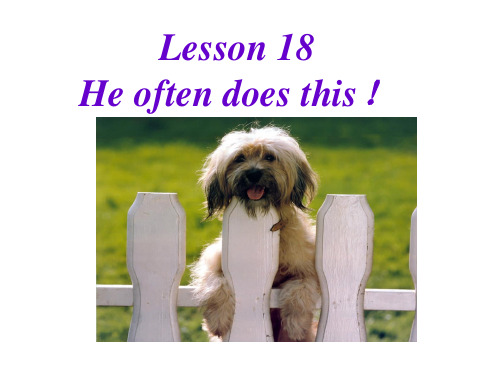
‘Did you have a good meal?’ he asked.
‘Yes, thank you,’ I answered, ‘but I can’t pay the bill. I haven’t got my bag.’
The landlord smiled and immediately went out. In a few minutes he returned with my bag and gave it back to me.
writer.
Lesson18 He often does this!
After I had had lunch at a village pub, I looked for my bag. I had left it on a chair beside the door and now it wasn’t there! As I was looking for it, the landlord came in.
just kite bill .
Today we’ll listen to a story about a woman who couldn’t find her handbag.
True or false?
1.The writer had lunch at a village pub. 2.She couldn’t find her bag after her meal . 3.She could pay the bill . 4.The landlord soon found it for her. 5.The dog had taken it into the park.
2. look for 寻找(强调找的过程)
‘Yes, thank you,’ I answered, ‘but I can’t pay the bill. I haven’t got my bag.’
The landlord smiled and immediately went out. In a few minutes he returned with my bag and gave it back to me.
writer.
Lesson18 He often does this!
After I had had lunch at a village pub, I looked for my bag. I had left it on a chair beside the door and now it wasn’t there! As I was looking for it, the landlord came in.
just kite bill .
Today we’ll listen to a story about a woman who couldn’t find her handbag.
True or false?
1.The writer had lunch at a village pub. 2.She couldn’t find her bag after her meal . 3.She could pay the bill . 4.The landlord soon found it for her. 5.The dog had taken it into the park.
2. look for 寻找(强调找的过程)
新概念英语第二册第18课ppt课件
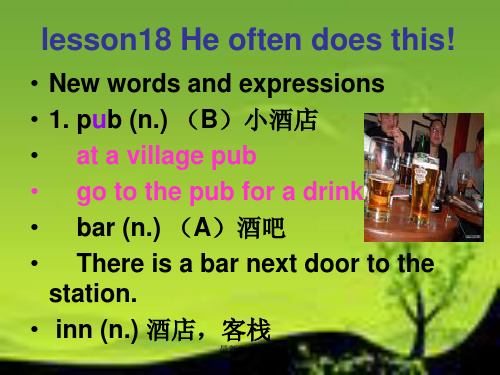
• have a good meal
'Yes, thank you,' I answered,
最新版整理ppt
5
'but I can't pay the bill.
pay the bill
I haven't got my bag.‘
have = have got = own = possess
• The landlord smiled and immediately went out.
• 在一家乡村小酒店
• I had left it on a chair beside the door and now it wasn't there !
• leave sth. sp.
• 把…落在..
• I left a suitcase on the train to London.
• beside (prep.) = next to
7
• 'I'm very sorry,' he said
‘ My dog had taken it into the garden.
take sth. to/into sp. 把…带到/带进…
Their father takes them to school everyday.
He often does this.' He 指My dog
•
☺传单,海报
• put up a bill on the wall
• billboard (n.)
• 宣传板,宣传栏 ad had lunch at a village pub, I looked for my bag.
新概念第二册 lesson 18课件(PPT26张)

5.As I was looking for it, the landlord came in. 当我正在寻找时,酒店老板走了进来。 As…,… = While…, … 当…,…发生了 eg.:昨晚当我睡着的时候,一个小偷进来了。
As I was sleeping , a thief came in.
Language points
3.In a few minutes he returned with my bag and give it back to me. in +一段时间 ......以后(常与将来时连用)
→ I will leave for Beijing in three months. return (come back) 回来; 归还
3、have还可以表示 eat, drink,enjoy,take等意思, →have dinner/ a meal/ a cup of coffee/a good time/ a bath
Grammar
have和have got to 互换
下面三种情况,have可以被have got取代 1.I have a pen.=I have got a pen. “有” Has he a lot of money?=Has he got a lot of money? =Does he have a lot of money? 2.I have a headache. “得病”= I have got a headache. 3.have to = have got to “不得不” He had to leave early.=He had got to leave early.
1
3 2
Let's take a 10-minute break!
As I was sleeping , a thief came in.
Language points
3.In a few minutes he returned with my bag and give it back to me. in +一段时间 ......以后(常与将来时连用)
→ I will leave for Beijing in three months. return (come back) 回来; 归还
3、have还可以表示 eat, drink,enjoy,take等意思, →have dinner/ a meal/ a cup of coffee/a good time/ a bath
Grammar
have和have got to 互换
下面三种情况,have可以被have got取代 1.I have a pen.=I have got a pen. “有” Has he a lot of money?=Has he got a lot of money? =Does he have a lot of money? 2.I have a headache. “得病”= I have got a headache. 3.have to = have got to “不得不” He had to leave early.=He had got to leave early.
1
3 2
Let's take a 10-minute break!
新概念英语第二册课件Lesson18

leave sth. with sb. leave sth. to sb.
表示"暂存",以后还要取回 表示以后不再索还
leave
使役动词,表示"使/ 让……保持某种状态" 出去时,不要关门。 Leave the door open when you go out. 形容词作宾语补足语 让他自个儿去做。 Leave him to do it himself. 不定式作宾语补足语 他们走开了,让我一个人坐在那儿。 They walked off and left me sitting there alone.
Lesson 18
He often does this!
Pepper
Daily Proverb
Know the enemy and know yourself, and you can
fight a hundred battles with no danger of defeat.
知己知彼,百战不殆
have用于某些短语,表示固定的意思。 1.had better+不带to的动词不定式,表示“…最好…” I'd better go and look for him now.
2.have nothing(something)to do with,表示“和…无(有)”关系。 Most of questions had nothing to do with Edison's lessons.
出卖,赠送 The strikers wouldn't give in. 投降,屈服 The flower gives off a good smell. 发出(光,味道等等)
发出(光,味道等等)
新概念英语第二册lesson18精品PPT课件
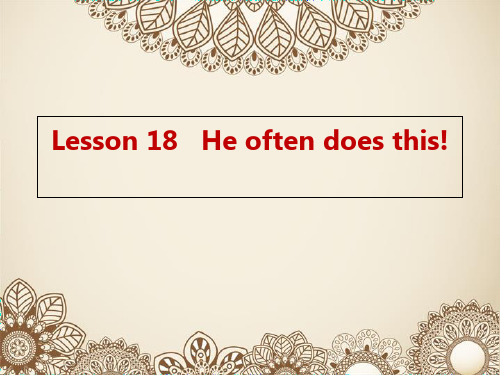
looked for my bag. I had left it on a chair beside the door and now it wasn't there! As I was looking for it, the landlord came in.'Did you have a good meal?" he asked.'Yes, thank you,' I answered, 'but I can't pay the bill. I haven't got my bag.'The landlord smiled and immediately went out. In a few minutes he returned with my bag and gave it back to me.'I'm very sorry,' he said. 'My dog had taken it into the garden. He often does this!'
住客栈
2 landlord
(1)主人, 房东(旅馆,家庭,公寓)
(2)地主
lord n . 统治者,主人,贵族,勋爵
Lord! 天啊!哎呀!哎哟! as drunk as a lord 酩酊大醉
landlady 女主人;
3 Bill 1) n. 账单,纸币 (note)
2) n. 招贴,广告,海报
1) n. 账单,纸币 (note) pay the bill/settle the bill
付账
It’s wrong to leave a hotel without paying all your bills. 没有付账离开旅馆是不对的。
住客栈
2 landlord
(1)主人, 房东(旅馆,家庭,公寓)
(2)地主
lord n . 统治者,主人,贵族,勋爵
Lord! 天啊!哎呀!哎哟! as drunk as a lord 酩酊大醉
landlady 女主人;
3 Bill 1) n. 账单,纸币 (note)
2) n. 招贴,广告,海报
1) n. 账单,纸币 (note) pay the bill/settle the bill
付账
It’s wrong to leave a hotel without paying all your bills. 没有付账离开旅馆是不对的。
新概念第二册18课 PPT

look for 寻找
我在寻找一个快速致富的方法。 I’m looking for a way to get rich quickly.
嘿,你在找茬吧。 Hey,you’re looking for trouble.
look after 照顾 = take care of 照顾自己 Please look after yourself.
Try to find out the line of the story
good meal – yes– can’t pay the bill– haven’t got
(dialogue 对话)
Try to find out the line of the story
Smiled and immediately went out – in a few minutes– returned with – gave it back – sorry – taken it into – often does this
What do you keep as a pet?
Dogs
Lesson 18 He often does this!
New words
pub [pʌb] n. 小酒店 public house
我们去酒吧喝一杯吧! Let’s go to the pub for a drink!
landlord ['lændlɔ:d] n. 店主,地主
parents, and get their signature; 3. Prepare an presentation with the
title of : The most interesting thing is ** .
新概念二第18课课件ppt

新概念二第18课课件
目录
• 课文讲解 • 练习与巩固 • 扩展与提高 • 课堂互动 • 总结与回顾
CHAPTER 01
课文讲解
词汇学习
总结词:重要词汇
详细描述:本课涉及的词汇包括“postcard”(明信片)、“envelope”(信 封)、“stamp”(邮票)等,这些词汇是日常生活中常用的,对于提高英语实 际应用能力非常重要。
话题讨论
设计与课文主题相关的话题,让学生 进行讨论或辩论,提高口语表达的逻 辑性和条理性。
写作练习
仿写练习
让学生仿写课文中的句子或段落,注重语法和词汇的准确运 用,以提高写作的基本功。
主题写作
设计与课文主题相关的写作任务,让学生进行创作,提高写 作的创意和表达能力。
CHAPTER 04
课堂互动
小组讨论
详细描述
在游戏互动中,学生通过参与各种游戏来学 习课程内容。这种方式能够让学生在轻松愉 快的氛围中学习知识,提高学习效果。同时 ,游戏互动还能够培养学生的团队协作和竞 争意识,增强学生的综合素质。
CHAPTER 05
总结与回顾
本课重点回顾
01
02
03
04Βιβλιοθήκη 掌握一般现在时的用法,了解 其与一般过去时的区别。
VS
详细描述
在角色扮演中,学生根据课程内容扮演不 同的角色,通过模拟场景来展示课程内容 。这种方式能够增强学生的参与感和体验 感,帮助学生更好地理解课程内容,提高 学习效果。同时,角色扮演还能够培养学 生的表演和表达能力,增强学生的综合素 质。
游戏互动
总结词
游戏互动是一种寓教于乐的课堂互动方式, 能够激发学生的学习兴趣和积极性。
CHAPTER 03
目录
• 课文讲解 • 练习与巩固 • 扩展与提高 • 课堂互动 • 总结与回顾
CHAPTER 01
课文讲解
词汇学习
总结词:重要词汇
详细描述:本课涉及的词汇包括“postcard”(明信片)、“envelope”(信 封)、“stamp”(邮票)等,这些词汇是日常生活中常用的,对于提高英语实 际应用能力非常重要。
话题讨论
设计与课文主题相关的话题,让学生 进行讨论或辩论,提高口语表达的逻 辑性和条理性。
写作练习
仿写练习
让学生仿写课文中的句子或段落,注重语法和词汇的准确运 用,以提高写作的基本功。
主题写作
设计与课文主题相关的写作任务,让学生进行创作,提高写 作的创意和表达能力。
CHAPTER 04
课堂互动
小组讨论
详细描述
在游戏互动中,学生通过参与各种游戏来学 习课程内容。这种方式能够让学生在轻松愉 快的氛围中学习知识,提高学习效果。同时 ,游戏互动还能够培养学生的团队协作和竞 争意识,增强学生的综合素质。
CHAPTER 05
总结与回顾
本课重点回顾
01
02
03
04Βιβλιοθήκη 掌握一般现在时的用法,了解 其与一般过去时的区别。
VS
详细描述
在角色扮演中,学生根据课程内容扮演不 同的角色,通过模拟场景来展示课程内容 。这种方式能够增强学生的参与感和体验 感,帮助学生更好地理解课程内容,提高 学习效果。同时,角色扮演还能够培养学 生的表演和表达能力,增强学生的综合素 质。
游戏互动
总结词
游戏互动是一种寓教于乐的课堂互动方式, 能够激发学生的学习兴趣和积极性。
CHAPTER 03
新概念二册第18课PPT课件

第15页/共55页
What we have learnt ,do you kown ?
pub
[pʌb] n. 小酒店
landlord ['lændlɔ:d]n. 店主,地主
bill
[bil] n. 账单,比尔
He 指宠物、she 山川、湖泊、国家、 建筑
Have 三种常见用法
第16页/共55页
Key structures:
have to = have got to
第23页/共55页
summary
1.现在完成时 “have + 过去分词”
过去完成时 “had + 过去分词”
2.拥有 have = have got = own = possess
得病 have = have got headache / fever /cough
第17页/共55页
Two different “had”s
After I had had lunch …,I looked for my bag.
had 1(past perfect)过去完成时的标 志
第18页/共55页
Have 的用法 (1)perfect tense
完成时
• Have you had lunch yet? • 你吃过午饭了吗?
3.固定短语 a.have dinner / lunch / breakfast
b.have a good time
c. Have a bath/ drink/ look/ conversation…
d. have to
第24页/共55页
第25页/共55页
Let’s play a guessing game.(animal) 1.It runs very fast, people used it as a traffic tool in the old days.
What we have learnt ,do you kown ?
pub
[pʌb] n. 小酒店
landlord ['lændlɔ:d]n. 店主,地主
bill
[bil] n. 账单,比尔
He 指宠物、she 山川、湖泊、国家、 建筑
Have 三种常见用法
第16页/共55页
Key structures:
have to = have got to
第23页/共55页
summary
1.现在完成时 “have + 过去分词”
过去完成时 “had + 过去分词”
2.拥有 have = have got = own = possess
得病 have = have got headache / fever /cough
第17页/共55页
Two different “had”s
After I had had lunch …,I looked for my bag.
had 1(past perfect)过去完成时的标 志
第18页/共55页
Have 的用法 (1)perfect tense
完成时
• Have you had lunch yet? • 你吃过午饭了吗?
3.固定短语 a.have dinner / lunch / breakfast
b.have a good time
c. Have a bath/ drink/ look/ conversation…
d. have to
第24页/共55页
第25页/共55页
Let’s play a guessing game.(animal) 1.It runs very fast, people used it as a traffic tool in the old days.
新概念英语第二册18课ppt课件
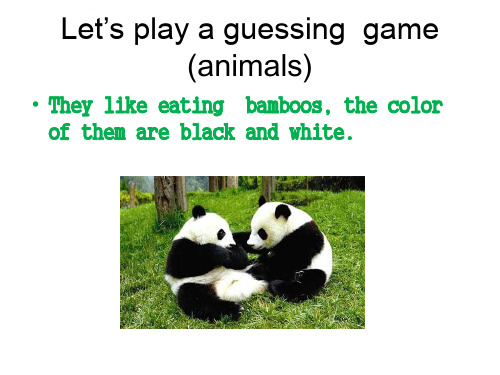
经营者提供商品或者服务有欺诈行为 的,应 当按照 消费者 的要求 增加赔 偿其受 到的损 失,增 加赔偿 的金额 为消费 者购买 商品的 价款或 接受服 务的费 用
现在完成时
• ①现在完成时 表示过去某时发生的某一动作对现在造 成影响或者是结果 I have finished reading the book .我已经读完这本书了。
过去完成时态
• ①过去完成时态表示在过去某一时刻或者动作以前已经完 成。即过去的过去。
我昨天已经完成我的作业了。 I had finished my homework yesterday . ②表示由过去的某一时刻开始,一直延续到过去另一时刻的
动作或者状态。 After he came back ,I had lived in Xiamen for 2 years .
give in =hand in 上交 投降 Though the problem is hard but I won’t give in.
give up give up smoking Do the exercise in page 82.
经营者提供商品或者服务有欺诈行为 的,应 当按照 消费者 的要求 增加赔 偿其受 到的损 失,增 加赔偿 的金额 为消费 者购买 商品的 价款或 接受服 务的费 用
• 'Did you have a good meal?" he asked. • 'Yes, thank you,' I answered, 'but I can't pay the
bill. I haven't got my bag.' • The landlord smiled and immediately went out.
新概念二册Lesson 18He often does this课件

text
• 1、After I had had lunch at a village pub, I looked for my bag. • Pub是public house(酒店,酒店) 的缩写 • Let’s go to the pub for a drink.
Two different “had”s
• look forward to 期待 + n. / V-ing • 我很期待国庆节。 • I’m looking forward to the National Day.
• 我很期待见到你 • I’m looking forward to meeting you.
Key sentence:
In a few minutes he returned with my bag and gave it back to me.
Have 的用法 (3)固定短语
• Have a bath/ drink/ look/ conversation…… • 洗个澡、喝一杯、看一下、聊一会、、 • Have a good time =enjoy oneself 玩得开心
Have to 不得不 Eg.:我不得不努力长胖 I have to grow fat
When we talk about a dog, what word will you think of?
New words
pub [pʌb] n. 小酒店 public house 我们去酒吧喝一杯吧! Let’s go to the pub for a drink!
1. pub n. 小酒店
Lesson 18 He often does this!
Everyday English
新概念英语第二册Lesson18课件

let’s watch a short video and find out how the dog is
Let’s watch a short video and find out how the dog is.
Listening Studio
ThWe lahnadtlohrda’d hs daopgpheandetdakteon tthheebwagriitnetro’thes gbaardge?n.
leave还可以作名词,表示“休假,假期”。 My best friend, Joan is spending her leave in Hawaii. 我最好的朋友琼正在夏威夷度假。
I had left it on a chair beside the door and now it wasn’t there!
I had left it on a chair beside the door and now it wasn’t there!
leave的用法
v. 离开(某处) Mr. Smith left the room at two o’clock. 史密斯先生两点离开房间的 。v. 留下;丢下;落下(常表示事物落在/忘在某处) Better take off your shoes and leave them outside. 最好把鞋子脱掉,放在外面。 v. 留给;交给(一般与介词with或to搭配) We didn’t find him and left word with his neighbour. 我们没有找到他,于是留了口信给他的邻居。
Reading Land
Read and learn.
After I had had my lunch at a village pub, I looked for my bag. I had left it on a chair beside the door and now it wasn’t there! As I was looking for it, the landlord came in.‘Did you have a good meal?’ he asked.‘Yes, thank you,’ I answered, ‘but I can’t pay the bill. I haven’t got my bag.’The landlord smiled and immediately went out. In a few minutes he returned with my bag and gave it back to me.‘I’m very sorry,’ he said. ‘My dog had taken it into the garden. He often does this!’
Let’s watch a short video and find out how the dog is.
Listening Studio
ThWe lahnadtlohrda’d hs daopgpheandetdakteon tthheebwagriitnetro’thes gbaardge?n.
leave还可以作名词,表示“休假,假期”。 My best friend, Joan is spending her leave in Hawaii. 我最好的朋友琼正在夏威夷度假。
I had left it on a chair beside the door and now it wasn’t there!
I had left it on a chair beside the door and now it wasn’t there!
leave的用法
v. 离开(某处) Mr. Smith left the room at two o’clock. 史密斯先生两点离开房间的 。v. 留下;丢下;落下(常表示事物落在/忘在某处) Better take off your shoes and leave them outside. 最好把鞋子脱掉,放在外面。 v. 留给;交给(一般与介词with或to搭配) We didn’t find him and left word with his neighbour. 我们没有找到他,于是留了口信给他的邻居。
Reading Land
Read and learn.
After I had had my lunch at a village pub, I looked for my bag. I had left it on a chair beside the door and now it wasn’t there! As I was looking for it, the landlord came in.‘Did you have a good meal?’ he asked.‘Yes, thank you,’ I answered, ‘but I can’t pay the bill. I haven’t got my bag.’The landlord smiled and immediately went out. In a few minutes he returned with my bag and gave it back to me.‘I’m very sorry,’ he said. ‘My dog had taken it into the garden. He often does this!’
- 1、下载文档前请自行甄别文档内容的完整性,平台不提供额外的编辑、内容补充、找答案等附加服务。
- 2、"仅部分预览"的文档,不可在线预览部分如存在完整性等问题,可反馈申请退款(可完整预览的文档不适用该条件!)。
- 3、如文档侵犯您的权益,请联系客服反馈,我们会尽快为您处理(人工客服工作时间:9:00-18:30)。
1. 立即的,即刻的 萧先生没有立即回答。
Mr. Shaw made no immediate answer.
2. 目前的,当前的[B] 我们的当务之急是阻止火势向其他建筑物蔓 延。
Our immediate concern was to prevent the fire from spreading to other buildings.
The store sent me a bill for $50.
•
• ②[n]招贴,广告牌 • a movie bill NO bills !
Bill
及物动词 vt.
n. [C]
1. 给...开帐单;要...付款 请以后开帐单给我。
Please bill me later.
immediate a. [Z] adv. Immediately
Give it over to me.
GIVE
我对你已经丧失信心, 因为你太想占有,而非爱慕,
因为你的欲望好似一只散发恶臭的臭虫,
而非发射温暖的太阳。 把你所谓的“爱”收回吧, 否则我会自己退还。
GIVE
I have given up on you totally, because you want possession rather than love, because your love is an insect giving off
HAVE:有,拥有
英国英语 I have got a car.
Have you got a car?
No, I haven‟t got a car. 在不是一般现在时的情况下,英国用法同美 国用法
HAVE:有,拥有
美国英语: I have a car. Do you have a ca
bill
• • • •
①账单、纸币 pay the bill =settle the bill 付账 It’s wrong to leave a hotel without paying your bills. Bill please !买单 *** 帐单[(+for)] 那家商店寄给我一张五十美元的帐单。
immediate goods 直接财产 immediate interests 眼前利益
立刻,马上的几种说法
at once; immediately; instantly; in an instant; on the instant ; in no time; right away ; soon ; straight away
He often does this.'
KEY STRUCTURE
HAVE
HAVE:助动词
I haven‟t seen him this morning.
When I rang, Tim had already left.
After I had had my lunch, I went out for a walk.
vegetables. give up 放弃,投降 (doing sth. , on sb.) give way to 让步,退却,让路于
GIVE
我的一切都让位与你, 因为我永远不会放弃爱你。
因为除了对你,
我不会向任何人屈服。 所以,请不要把你的爱随便的给别人, 请将你的爱留给我。
GIVE
Everything of mine has given way to you, because I will never give up loving you, because I will never give in to anyone, but you. So don‟t give your love away to anyone, please.
GIVE
give away 赠送,放弃,泄漏
give back 归还,送回
give in 认输,投降,屈服(to) 交上,呈上 give off 发出 (气味)
GIVE
give out 分发——宣布,发出,散发(光) give over to 留作(特定用途)
Much of the garden was given over to
HE OFTEN DOES THIS
Leading in
1.Where did the writer leave her handbag? 2.Why couldn‘t she pay the bill? 3.What had happened to her handbag?
TEXT
had had lunch
After________ I at a village inn, I looked
left
for my bag. I had ______it on a chair
now
beside the door and ___it wasn't
As I was looking for it there!____________, the inn-keeper came
in. 'Did you have a good meal?' he asked.
'Yes, thank you,' I answered, 'but I can't________. I haven't got my bag.' The inn-keeper smiled and immediately went
I had a car. Did you have a car? No, I did not have a car. 说明:现在英国人也学美国人这么说了。
HAVE:表示吃,喝,enjoy, take等等
I am having my breakfast. I had a good holiday.
I had a letter from him yesterday.
odor, rather than the sun giving out warmth.
Put your so-called “love” away,
or I will give it back myself.
Insead of saying P81
e.g. It wasn‟t there. =It was gone.=It was missing.
good=?
fine,positive, favorable, perfect ,pleasurable rosy ['rozɪ] (美好的) ,promising (有希望的), excellent, outstanding, superior ,fantastic
have have got own possess occupy
Words & expressions
1.beside 介词 prep. 1. 在...近旁;在旁边 他在艾玛身旁坐下。
He sat down beside Emma
2. 除此以外(现在一般用besides)
by, at, beside, near ,next to的区别 1) by和beside均表示“在……旁边”,常可 换用 The hotel is beside (/by) the river. 那家 饭店在河边。 Come and sit beside (/by) me. 过来,坐在我边上。 2) near表示“在……附近”,表示的距离比 by和beside稍远 些,也时常换用 Don„t play near the road. 不要在马路附近玩。 3) next to表示“紧靠……的旁边” 翻译(后置定语) 书店旁边的那幢新楼是一家电影院。 The new building next to the bookstore is a cinema.
have的用法
一般来说,have got较口语化
with my bag In a few minutes out. ___________he returned _______and pay the bill
gave it back to me. 'I'm very sorry,' he
said ' My dog had taken it into the garden.
Mr. Shaw made no immediate answer.
2. 目前的,当前的[B] 我们的当务之急是阻止火势向其他建筑物蔓 延。
Our immediate concern was to prevent the fire from spreading to other buildings.
The store sent me a bill for $50.
•
• ②[n]招贴,广告牌 • a movie bill NO bills !
Bill
及物动词 vt.
n. [C]
1. 给...开帐单;要...付款 请以后开帐单给我。
Please bill me later.
immediate a. [Z] adv. Immediately
Give it over to me.
GIVE
我对你已经丧失信心, 因为你太想占有,而非爱慕,
因为你的欲望好似一只散发恶臭的臭虫,
而非发射温暖的太阳。 把你所谓的“爱”收回吧, 否则我会自己退还。
GIVE
I have given up on you totally, because you want possession rather than love, because your love is an insect giving off
HAVE:有,拥有
英国英语 I have got a car.
Have you got a car?
No, I haven‟t got a car. 在不是一般现在时的情况下,英国用法同美 国用法
HAVE:有,拥有
美国英语: I have a car. Do you have a ca
bill
• • • •
①账单、纸币 pay the bill =settle the bill 付账 It’s wrong to leave a hotel without paying your bills. Bill please !买单 *** 帐单[(+for)] 那家商店寄给我一张五十美元的帐单。
immediate goods 直接财产 immediate interests 眼前利益
立刻,马上的几种说法
at once; immediately; instantly; in an instant; on the instant ; in no time; right away ; soon ; straight away
He often does this.'
KEY STRUCTURE
HAVE
HAVE:助动词
I haven‟t seen him this morning.
When I rang, Tim had already left.
After I had had my lunch, I went out for a walk.
vegetables. give up 放弃,投降 (doing sth. , on sb.) give way to 让步,退却,让路于
GIVE
我的一切都让位与你, 因为我永远不会放弃爱你。
因为除了对你,
我不会向任何人屈服。 所以,请不要把你的爱随便的给别人, 请将你的爱留给我。
GIVE
Everything of mine has given way to you, because I will never give up loving you, because I will never give in to anyone, but you. So don‟t give your love away to anyone, please.
GIVE
give away 赠送,放弃,泄漏
give back 归还,送回
give in 认输,投降,屈服(to) 交上,呈上 give off 发出 (气味)
GIVE
give out 分发——宣布,发出,散发(光) give over to 留作(特定用途)
Much of the garden was given over to
HE OFTEN DOES THIS
Leading in
1.Where did the writer leave her handbag? 2.Why couldn‘t she pay the bill? 3.What had happened to her handbag?
TEXT
had had lunch
After________ I at a village inn, I looked
left
for my bag. I had ______it on a chair
now
beside the door and ___it wasn't
As I was looking for it there!____________, the inn-keeper came
in. 'Did you have a good meal?' he asked.
'Yes, thank you,' I answered, 'but I can't________. I haven't got my bag.' The inn-keeper smiled and immediately went
I had a car. Did you have a car? No, I did not have a car. 说明:现在英国人也学美国人这么说了。
HAVE:表示吃,喝,enjoy, take等等
I am having my breakfast. I had a good holiday.
I had a letter from him yesterday.
odor, rather than the sun giving out warmth.
Put your so-called “love” away,
or I will give it back myself.
Insead of saying P81
e.g. It wasn‟t there. =It was gone.=It was missing.
good=?
fine,positive, favorable, perfect ,pleasurable rosy ['rozɪ] (美好的) ,promising (有希望的), excellent, outstanding, superior ,fantastic
have have got own possess occupy
Words & expressions
1.beside 介词 prep. 1. 在...近旁;在旁边 他在艾玛身旁坐下。
He sat down beside Emma
2. 除此以外(现在一般用besides)
by, at, beside, near ,next to的区别 1) by和beside均表示“在……旁边”,常可 换用 The hotel is beside (/by) the river. 那家 饭店在河边。 Come and sit beside (/by) me. 过来,坐在我边上。 2) near表示“在……附近”,表示的距离比 by和beside稍远 些,也时常换用 Don„t play near the road. 不要在马路附近玩。 3) next to表示“紧靠……的旁边” 翻译(后置定语) 书店旁边的那幢新楼是一家电影院。 The new building next to the bookstore is a cinema.
have的用法
一般来说,have got较口语化
with my bag In a few minutes out. ___________he returned _______and pay the bill
gave it back to me. 'I'm very sorry,' he
said ' My dog had taken it into the garden.
